Policy Workshop on Japan Kenya Relations
2016/3/4
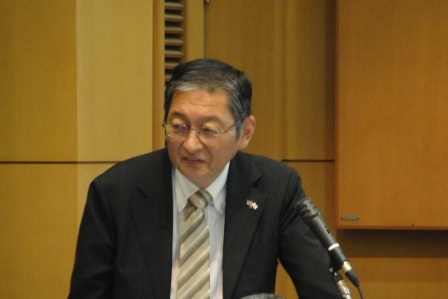
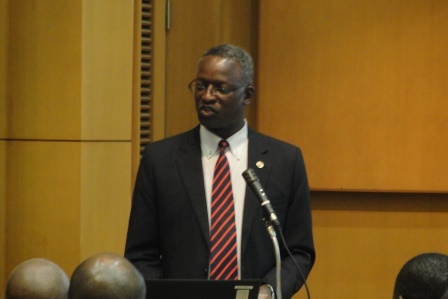
(The First Pre-event of TICAD VI)
TICAD Process and Japanese Private Sector
As the firs pre-event of TICAD (Tokyo International Conference on African Development) VI, a Policy Workshop was held at the Embassy of Japan on Friday, 4th March, 2016. A total of 125 participants attended the workshop. The Workshop consisted of a Public Lecture delivered by Mr. Koenuma Akihito, General Manager at Marubeni Corporation, Abidjan Office; Followed by the Public Lecture was a Panel Discussion. The panelists for this discussion were Mr. Polycarp Igathe, Managing Director, Vivo Energy Kenya; Mr. Kennedy Manyala, Chief Operating Officer, Kenya Private Sector Alliance (KEPSA); Prof. Wainaina Gituro, Acting Director General, Kenya Vision 2030 Delivery Secretariat; and Mr. Mikio Mori, Minister and Deputy Chief of Mission, Embassy of Japan. As a moderator, Prof. Peter Kagwanja, Chief Executive, Africa Policy Institute, participated in the discussion.The Policy Workshop was officially opened by Mr. Tatsushi Terada, Ambassador of Japan in Kenya and Ambassador Ben Ogutu, Director General of the TICAD VI Secretariat within the Government of Kenya. In his opening remarks, Ambassador Terada informed the audience that the main aim of the policy workshop was to highlight the importance of TICAD in bringing about resilient and sustainable growth in the African continent with an emphasis placed on private investment in Africa. Ambassador Ogutu reiterated this fact by stating that for the first time the TICAD conference would involve the private sector in the plenary sessions with heads of states.
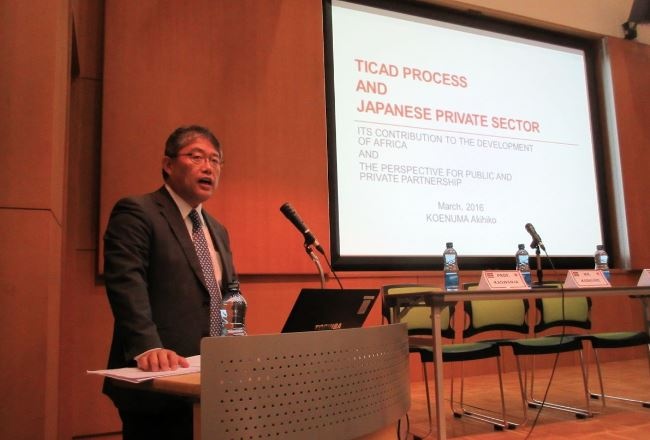
Following the opening ceremony, Mr. Koenuma took the audience through the past contributions of TICAD focusing on the role it has played in the development of Africa and the way forward for boosting Japanese private investment. The lecture covered several topics which included:
- Africa’s Development Path and the TICAD Process. Here, Mr. Koenuma mentioned that TICAD was introduced against a backdrop of deepening poverty in Africa, aid fatigue of development partners towards Africa and a time when helping Africa meant poverty eradication and not infrastructure development which is akin to giving a man a fish as opposed to teaching him how to fish.
- The Contribution of the Past Five TICAD Conferences. Mr. Koenuma talked about the contribution and growth of the conferences beginning with:
- the first TICAD conference when emphasis was placed on political and economic reform
- the ownership of the development process by African States
- latter contributions which included the emphasis on infrastructure development, capacity building, promotion of sustainable and resilient growth and the creation of an inclusive society for growth
- The Contribution of the Government of Japan to Africa’s Development through TICAD. This includes poverty alleviation, education, universal health coverage (UHC) and the promotion of the private sector among others.
- The Contribution of the Japanese Private Sector to Africa’s Development
- Japan’s Public-Private Partnership Work in other Emerging Markets. That is, emerging markets in countries in South and South East Asia
- Future Expectations of Japan’s Contribution to the African Continent. The promotion of private-public partnerships especially seen through an increase in the number of Japanese companies in Kenya (25 Japanese companies in 2012 to 41 in 2016)
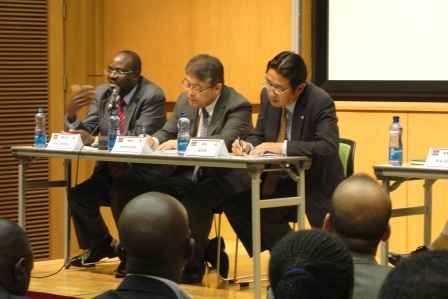
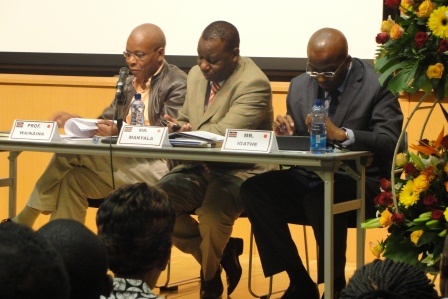
Some of the issues raised during the panel discussion were:
- The need for Japan to market itself more. Professor Kagwanja stated that TICAD was introduced during one of the lowest moments of African engagement when Africa was being isolated by the world. He added that Japan’s engagement with Africa has been longer and more consistent compared to that of other foreign nations yet after all this time, little is known about TICAD. Further to this, he emphasized the need for the reformation of TICAD whereby Africa is engaged in an innovative way (engaging Africa one on one).
- The need for the private sector to be ready for TICAD VI. Mr. Igathe agreed with Professor Kagwanja’s sentiment that there was a need for more build-up to TICAD especially in relation to the private sector if it was expected to participate fully and effectively in the upcoming conference. He added that he was looking to prepare his colleagues in the private sector to engage Japan and for them to become more doers than takers.
- Expectations of the private sector out of TICAD VI. Mr. Manyala questioned whether a perfect business environment, would make the African Private Sector competitive. In reference to this, he put forward his expectations of the TICAD VI conference which included: enterprise development, technology uptake whereby he noted the need to improve the skills of the private sector and to transform the education system so that it is responsive to the world reality (for example, examining subjects that add value to the future and strengthening polytechnics for much needed skills development) and the development of clean energy mechanisms.
- Transformation of society. Prof. Wainaina noted that development cannot be achieved by the government alone or by multinationals. Instead, to transform society it was necessary to deal with issues of inclusive growth especially when it comes to gender, education and social cohesion, good governance and democracy, people driven development, opportunity for upward mobility, a globally competitive service sector among other issues.
- The uniqueness of TICAD VI. Mr. Mori closed the panel discussion by informing the participants that unlike the previous TICAD meetings, TICAD VI would be outstanding because of its enhanced inclusive nature. For the first time, the private sector (both the Japanese private sector and the Kenyan private sector) would be included in the plenary sessions. TICAD VI would also address the issues of African development such as health, peacebuilding, infrastructure development and human capacity development. Since the issues to be discussed at the TICAD conference are many and the time limited, Mr. Mori promised that there would be a follow-up action plan.
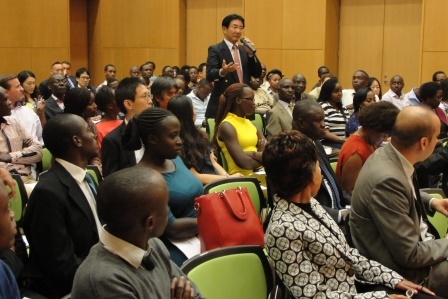
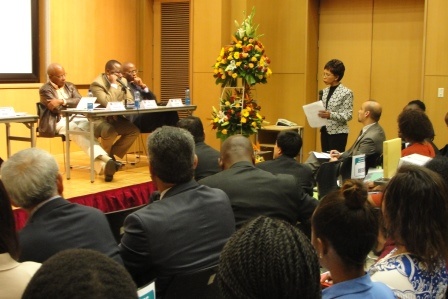
The question and answer session revealed a variety of questions which cut across the board. They included questions about:
The Policy Workshop was closed by Prof. Kagwanja. In his closing remarks, the Professor stated that to learn a people’s work ethic, it was necessary to have an exchange forum. In addition to this, he mentioned that for TICAD VI to be a success, there was need for:
The Japanese Embassy is committed to bringing about a series of economic, cultural, political as well as social events, up to the Conference in August.
- the motivation of the Japanese private sector to be involved in Africa at such a crucial time of its history
- how to compete well in a situation where good quality means high price
- the future of Japan investment where governance is a problem
The Policy Workshop was closed by Prof. Kagwanja. In his closing remarks, the Professor stated that to learn a people’s work ethic, it was necessary to have an exchange forum. In addition to this, he mentioned that for TICAD VI to be a success, there was need for:
- systematic build up activities that cut across sectors
- Africa to have the will to showcase what it has
- Japan to bring what it considers necessary for Africa needs and
- for TICAD VI to start on a new slate by focusing on what African wants and where it is headed.
The Japanese Embassy is committed to bringing about a series of economic, cultural, political as well as social events, up to the Conference in August.
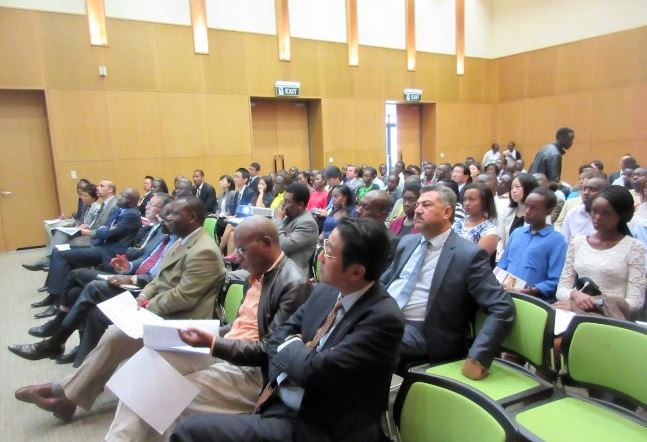

 (68KB)
(68KB)